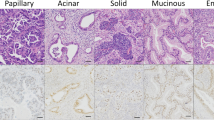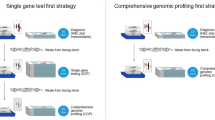Abstract
Background: Epidermal growth factor receptor (EGFR) mutational status has the potential to be useful for determining prospective therapies in patients with non-small cell lung cancer (NSCLC) when analyzed in transbronchial cell specimens. The efficacy of RNA-based methods for the detection of EGFR mutations in transbronchial cell specimens has not been studied. Ultrafast Papanicolaou (UFP) staining is a method used in the immediate assessment of cytology during bronchoscopic examination.
Objectives: The aims of this study were (i) to compare the efficacy of RNA-based methodology for the detection of EGFR mutations with DNA-based methodology; and (ii) to assess the analysis of EGFR mutational status in transbronchial cell specimens, utilizing UFP staining.
Methods: EGFR mutant PC9 and NCI-H1975 cells were combined with wild-type EGFR white blood cells (WBCs), and the RNA and DNA were extracted. The sensitivity for the detection of EGFR mutations was determined. Polymerase chain reaction (PCR)-based methods, including reverse transcriptase (RT)-PCR and PCR-restriction fragment length polymorphism (RFLP), and sequencing were performed to detect the EGFR mutations. Seventy-one cell samples from bronchoscopic examinations that utilized UFP staining in patients with NSCLC were also analyzed for EGFR mutations.
Results: EGFR mutations were detected in a small number of cancer cells (ten cells), even in the presence of 1×106 WBCs, by the RNA-based methodology (either RT-PCR or PCR-RFLP) [sensitivity: <10−5]. However, the DNA-based method exhibited lower sensitivity (10−1). EGFR mutations were detected in 21 of 71 NSCLC samples (29.6%) and in 19 of 43 adenocarcinomas (44.2%) by the RNA-based methodology. The DNA-based methodology failed to detect EGFR mutations in several cases, while the RNA-based methodology was able to detect them.
Conclusions: Rapid diagnosis during bronchoscopy, utilizing UFP staining, contributed to the selection of the best samples for genetic analysis. EGFR mutations could be detected in a small number of cancer cells by the RNA-based methodology, with higher sensitivity than the DNA-based methodology, even in samples where numerous normal cells were present. Our present strategy can be integrated into the clinical process without additional invasive examination of patients and provides information regarding the EGFR mutational status.





Similar content being viewed by others
References
Lynch TJ, Bell DW, Sordella R, et al. Activating mutations in the epidermal growth factor receptor underlying responsiveness of non-small-cell lung cancer to gefitinib. N Engl J Med 2004 May; 350(21): 2129–39
Paez JG, Jänne PA, Lee JC, et al. EGFR mutations in lung cancer: correlation with clinical response to gefitinib therapy. Science 2004 Jun; 304(5676): 1497–500
Pao W, Miller V, Zakowski M, et al. EGF receptor gene mutations are common in lung cancers from “never smokers” and are associated with sensitivity of tumors to gefitinib and erlotinib. Proc Natl Acad Sci U S A 2004 Sep; 101(36): 13306–11
Han SW, Kim TY, Lee KH, et al. Clinical predictors versus epidermal growth factor receptor mutation in gefitinib-treated non-small-cell lung cancer patients. Lung Cancer 2006 Nov; 54(2): 201–7
Yang GC, Alvarez II. Ultrafast Papanicolaou stain: an alternative preparation for fine needle aspiration cytology. Acta Cytol 1995 Jan-Feb; 39(1): 55–60
Bandoh S, Fujita J, Tojo Y, et al. Diagnostic accuracy and safety of flexible bronchoscopy with multiplanar reconstruction images and ultrafast Papanicolaou stain: evaluating solitary pulmonary nodules. Chest 2003 Nov; 124(5): 1985–92
Mukohara T, Engelman JA, Hanna NH, et al. Differential effects of gefitinib and cetuximab on non-small-cell lung cancers bearing epidermal growth factor receptor mutations. J Natl Cancer Inst 2005 Aug; 97(16): 1185–94
Sordella R, Bell DW, Haber DA, et al. Gefitinib-sensitizing EGFR mutations in lung cancer activate anti-apoptotic pathways. Science 2004 Aug; 305(5687): 1163–7
Mitsudomi T, Kosaka T, Yatabe Y. Biological and clinical implications of EGFR mutations in lung cancer. Int J Clin Oncol 2006 Jun; 11(3): 190–8
Tsao MS, Sakurada A, Cutz JC, et al. Erlotinib in lung cancer-molecular and clinical predictors of outcome. N Engl J Med 2005 Jul; 353(2): 133–44
Yang CH, Yu CJ, Shih JY, et al. Specific EGFR mutations predict treatment outcome of stage IIIB/IV patients with chemotherapy-naive non-small-cell lung cancer receiving first-line gefitinib monotherapy. J Clin Oncol 2008 Jun; 26(16): 2745–53
Wu SG, Chang YL, Hsu YC, et al. Good response to gefitinib in lung adenocarcinoma of complex epidermal growth factor receptor (EGFR) mutations with the classical mutation pattern. Oncologist 2008 Dec; 13(12): 1276–84
Kimura H, Fujiwara Y, Sone T, et al. High sensitivity detection of epidermal growth factor receptor mutations in the pleural effusion of non-small cell lung cancer patients. Cancer Sci 2006 Jul; 97(7): 642–8
Yatabe Y, Hida T, Horio Y, et al. A rapid, sensitive assay to detect EGFR mutation in small biopsy specimens from lung cancer. J Mol Diagn 2006 Jul; 8(3): 335–41
Cohen V, Agulnik JS, Jarry J, et al. Evaluation of denaturing high-performance liquid chromatography as a rapid detection method for identification of epidermal growth factor receptor mutations in nonsmall-cell lung cancer. Cancer 2006 Dec; 107(12): 2858–65
Asano H, Toyooka S, Tokumo M, et al. Detection of EGFR gene mutation in lung cancer by mutant-enriched polymerase chain reaction assay. Clin Cancer Res 2006 Jan; 12(1): 43–8
Hoshi K, Takakura H, Mitani Y, et al. Rapid detection of epidermal growth factor receptor mutations in lung cancer by the SMart-Amplification Process. Clin Cancer Res 2007 Sep; 13(17): 4974–83
Fukui T, Ohe Y, Tsuta K, et al. Prospective study of the accuracy of EGFR mutational analysis by high-resolution melting analysis in small samples obtained from patients with non-small cell lung cancer. Clin Cancer Res 2008 Aug; 14(15): 4751–7
Yung TK, Chan KC, Mok TS, et al. Single-molecule detection of epidermal growth factor receptor mutations in plasma by microfluidics digital PCR in non-small cell lung cancer patients. Clin Cancer Res 2009 Mar; 15(6): 2076–84
Zhao J, Zhao J, Huang J, et al. A novel method for detection of mutation in epidermal growth factor receptor. Lung Cancer 2011 Nov; 74(2): 226–32
Hlinkova K, Babál P, Berzinec P, et al. Rapid and efficient detection of EGFR mutations in problematic cytologic specimens by high-resolution melting analysis. Mol Diagn Ther 2011 Feb; 15(1): 21–9
Gandhi J, Zhang J, Xie Y, et al. Alterations in genes of the EGFR signaling pathway and their relationship to EGFR tyrosine kinase inhibitor sensitivity in lung cancer cell lines. PLoS One 2009; 4(2): e4576
Kanaji N, Bandoh S, Nagamura N, et al. Significance of an epidermal growth factor receptor mutation in cerebrospinal fluid for carcinomatous meningitis. Intern Med 2007; 46(19): 1651–5
Kosaka T, Yatabe Y, Endoh H, et al. Mutations of the epidermal growth factor receptor gene in lung cancer: biological and clinical implications. Cancer Res 2004 Dec; 64(24): 8919–23
Tokumo M, Toyooka S, Kiura K, et al. The relationship between epidermal growth factor receptor mutations and clinicopathologic features in non-small cell lung cancers. Clin Cancer Res 2005 Feb; 11(3): 1167–73
Sonobe M, Manabe T, Wada H, et al. Mutations in the epidermal growth factor receptor gene are linked to smoking-independent, lung adenocarcinoma. Br J Cancer 2005 Aug; 93(3): 355–63
Tomizawa Y, Iijima H, Sunaga N, et al. Clinicopathologic significance of the mutations of the epidermal growth factor receptor gene in patients with non-small cell lung cancer. Clin Cancer Res 2005 Oct; 11 (19 Pt 1): 6816–22
Sugio K, Uramoto H, Ono K, et al. Mutations within the tyrosine kinase domain of EGFR gene specifically occur in lung adenocarcinoma patients with a low exposure of tobacco smoking. Br J Cancer 2006 Mar; 94(6): 896–903
Soda M, Choi YL, Enomoto M, et al. Identification of the transforming EML4-ALK fusion gene in non-small-cell lung cancer. Nature 2007 Aug; 448(7153): 561–6
Sasaki T, Rodig SJ, Chirieac LR, et al. The biology and treatment of EML4-ALK non-small cell lung cancer. Eur J Cancer 2010 Jul; 46(10): 1773–80
Kwak EL, Bang YJ, Camidge DR, et al. Anaplastic lymphoma kinase inhibition in non-small-cell lung cancer. N Engl J Med 2010 Oct; 363(18): 1693–703
Acknowledgments
The authors have no conflicts of interest to declare. There were no sources of funding for this study. The authors thank Takimi Tamaki for excellent technical assistance in the molecular analyses of cells and the patients’ samples.
Author information
Authors and Affiliations
Corresponding author
Rights and permissions
About this article
Cite this article
Kanaji, N., Bandoh, S., Ishii, T. et al. Detection of Epidermal Growth Factor Receptor Mutations in a Few Cancer Cells from Transbronchial Cytologic Specimens by Reverse Transcriptase-Polymerase Chain Reaction. Mol Diag Ther 15, 353–359 (2011). https://doi.org/10.1007/BF03256471
Published:
Issue Date:
DOI: https://doi.org/10.1007/BF03256471




